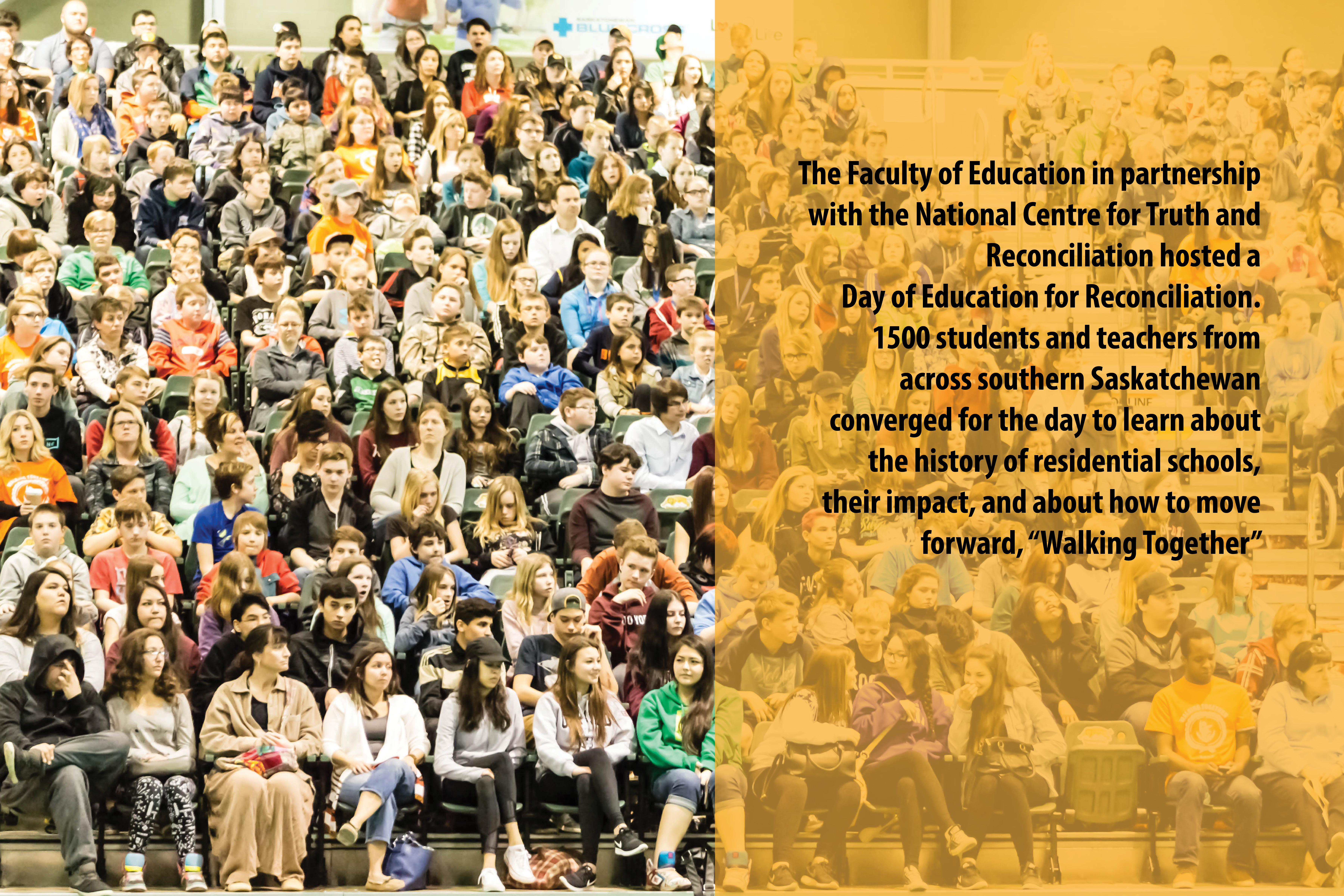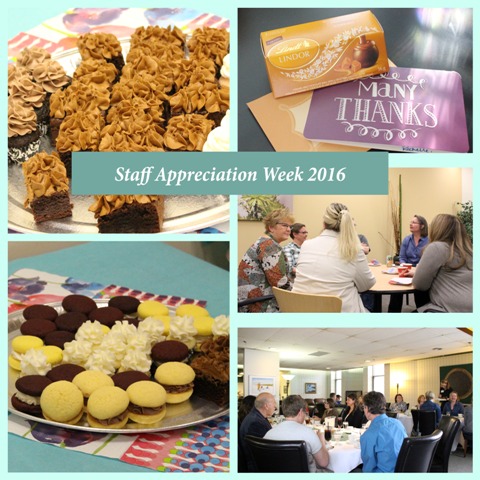 This week was made special for staff who shared a lunch at the University Club, received a visit at their offices by Dean Jennifer Tupper and General Administrator, Rochelle Fenwick (who gifted staff with chocolate treats and thank you cards), and had opportunity to visit over a coffee break with assorted cakes; all efforts of the administration to let staff know how much they are valued and appreciated.
This week was made special for staff who shared a lunch at the University Club, received a visit at their offices by Dean Jennifer Tupper and General Administrator, Rochelle Fenwick (who gifted staff with chocolate treats and thank you cards), and had opportunity to visit over a coffee break with assorted cakes; all efforts of the administration to let staff know how much they are valued and appreciated.
Month: April 2016
Dean Tupper Co-Investigator on Successful SSHRC Insight Grant
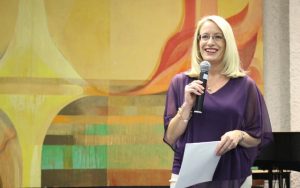
Dr. Jennifer Tupper, Dean of the Faculty of Education, is a Co-Investigator on a successful Social Sciences and Humanities Research Council (SSHRC) Insight Grant project entitled Aboriginal Perspectives at the Cultural Interface: Researching the Interventions. This five-year research project, involving two other scholars from the University of Manitoba, Dr. Yatta Kanu (Principal Investigator) and Dr. Frank Deer (Co-Investigator), received $229,334 in funding.
Congratulations to Dr. Tupper as she engages in this important and timely study.
Faculty Member Part of Team Researching Teachers’ Roles for Canada’s Creative Economy
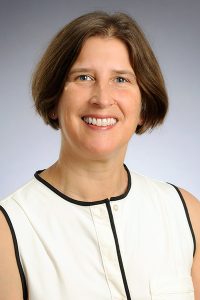 Dr. Kathryn Ricketts is one of the co-applicants on a successful SSHRC Insight Grant for the project entitled Reconceptualizing Teachers’ Roles for Canada’s Creative Economy. The four-year research project involves scholars from UPEI, UBC, McGill, Cape Breton University, Royal Roads University and the University of Regina, and received over $300,000 in funding.
Dr. Kathryn Ricketts is one of the co-applicants on a successful SSHRC Insight Grant for the project entitled Reconceptualizing Teachers’ Roles for Canada’s Creative Economy. The four-year research project involves scholars from UPEI, UBC, McGill, Cape Breton University, Royal Roads University and the University of Regina, and received over $300,000 in funding.
Congratulations to Dr. Ricketts on her participation in this exciting research project.
Anthropology of the Discard: An Interactive Exhibition
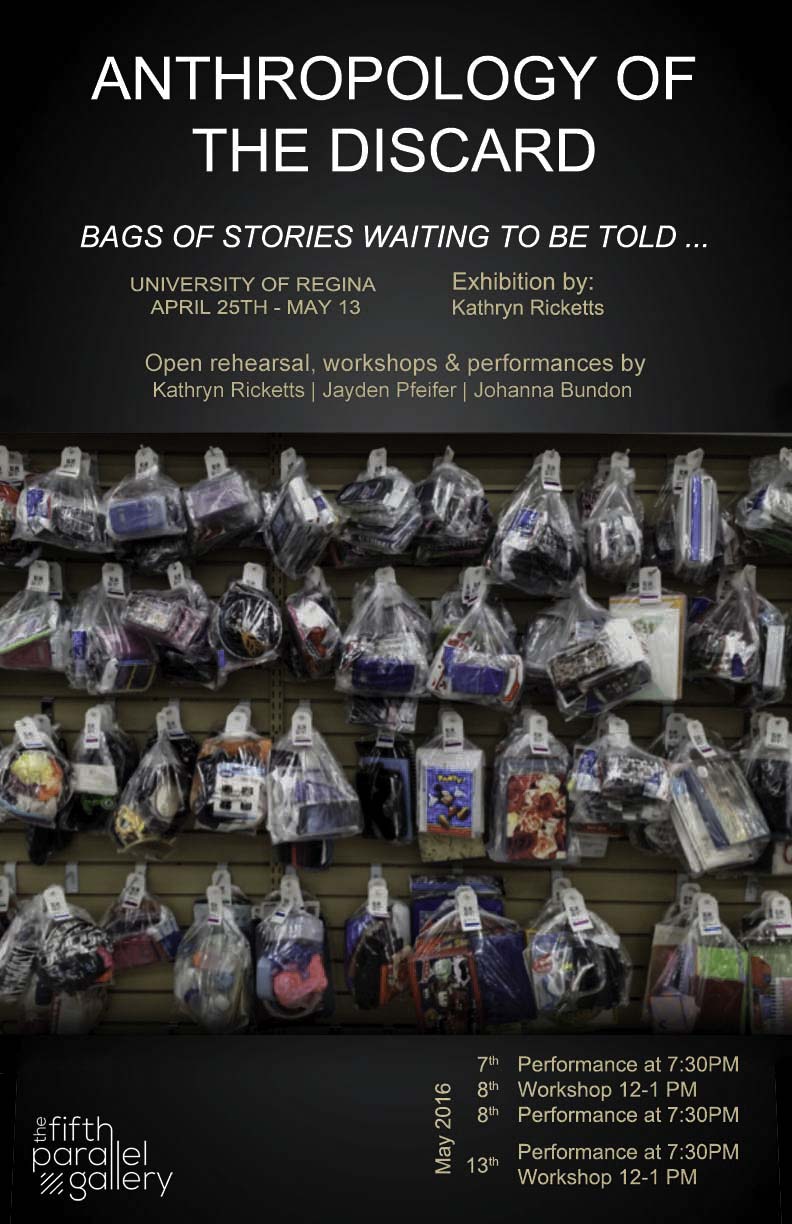 “Anthropology of the Discard” is an interactive exhibition illuminating the saliency of objects as triggers for performative storytelling. It is also a display of artifacts as emblems of lives lived, and lives that refuse to be seen in isolation of each other. Fascinated by the wall of Value Village where conglomerates of objects hang in plastic bags for the standard price of $2.99, Dr. Kathryn Ricketts has collected those that are ‘bulging’ with compelling possible new narratives.
“Anthropology of the Discard” is an interactive exhibition illuminating the saliency of objects as triggers for performative storytelling. It is also a display of artifacts as emblems of lives lived, and lives that refuse to be seen in isolation of each other. Fascinated by the wall of Value Village where conglomerates of objects hang in plastic bags for the standard price of $2.99, Dr. Kathryn Ricketts has collected those that are ‘bulging’ with compelling possible new narratives.
Grad student Jayden Pfeifer and dancer Johanna Bundon have been experimenting along with Kathryn Ricketts for several months around these concepts. Join them in a performative exhibition in April/May at The Fifth Parallel, (U of R, Riddell Centre) where they are excited to share their deepened understanding of the power of objects.
The audience is invited to construct their own bulging bag of stories (ongoing). Bags and objects will be available in the gallery or participants can bring their own constructed bag of objects from home.
Watch an open rehearsal to see how the performed stories are constructed (Posted at Gallery). Watch a 30 min performance of a bulging bag of evocative objects (May 7, 8 & 12th, 7:30 PM). Take in a workshop to learn how to create performative narratives from discarded objects. (May 7 & 8th 12 – 1 PM)
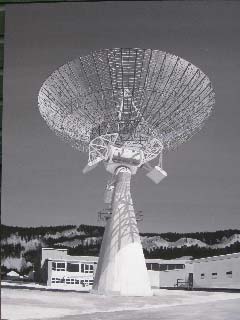
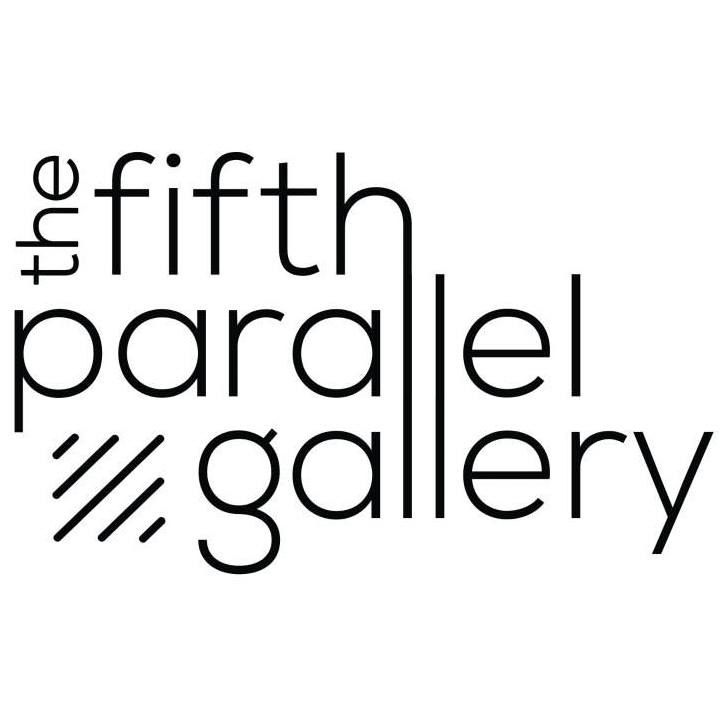
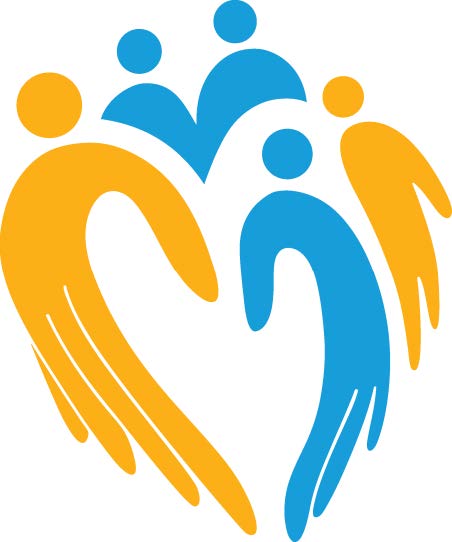
New Issue of Education News | Fall 2015/Winter 2016
Click on the cover photo to access Education News
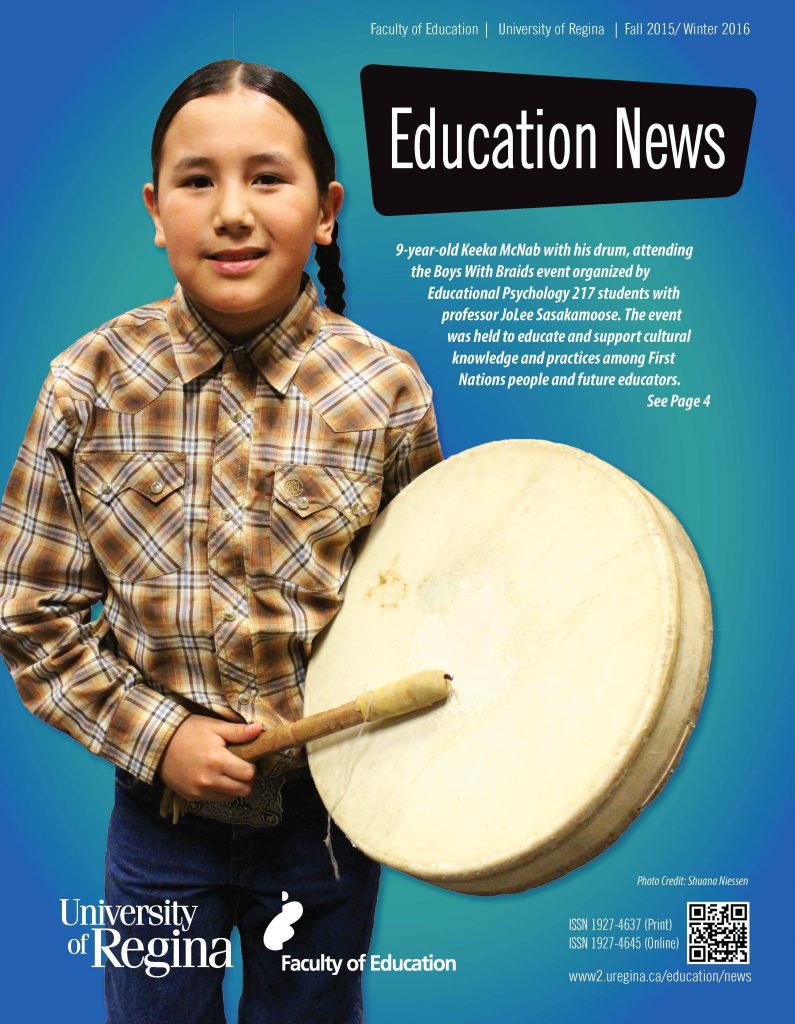
Click to launch the full edition in a new window
Publishing Software from YUDU
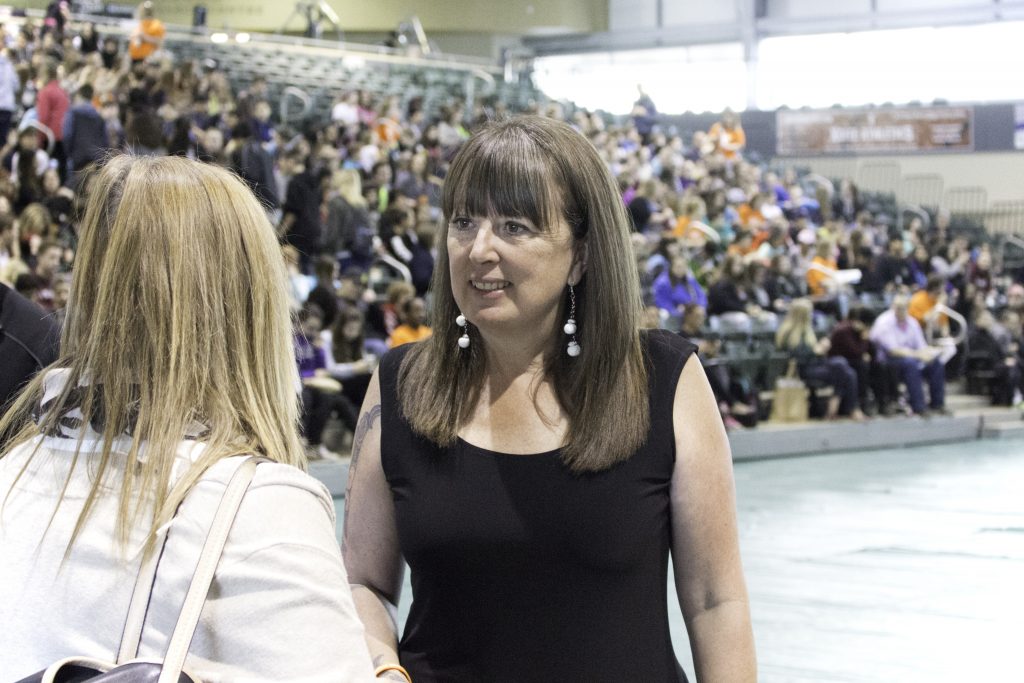
“Walking Together”: A Day of Education for Reconciliation
On April 14, the Faculty of Education, in partnership with the National Centre for Truth and Reconciliation (NCTR) hosted “Walking Together”: A Day of Education for Reconciliation for 1447 students (Grades 5 – 12) and 103 teachers from approximately 50 schools across Saskatchewan. Dean Jennifer Tupper says, “The numbers far exceeded our expectations and are indicative of our larger commitment to Indigenization and the history and legacy of residential schools in our province.” Participants learned about the history of residential schools, their impact, and about how to move forward, “Walking Together,” the theme chosen for the event.
Committee members brought together a meaningful schedule of activities in which students and teachers participated. The day began in a good way with a smudging ceremony for committee members and volunteers led by Life Speaker Noel Starblanket.
The opening included greetings from Dean Jennifer Tupper, Life Speaker Noel Starblanket, Indigenization Lead Shauneen Pete, Education Lead for the National Centre for Truth and Reconciliation Charlene Bearhead, and President Vianne Timmons who engaged the students with calls for a responsive “I will” regarding their commitment to participation. Eugene Arcand, a residential school survivor who served on the Truth and Reconciliation Commission Survivor Committee, asked survivors to stand and come forward so they could be recognized and honoured. Indigenous drumming and singing reminded participants to remember those who have gone before them. Elder Alma Poitras explains that “drums are more than the heartbeat of mother earth. They are our ancestors reminding of where we come from. Each tribe has their own identity, but for me when I hear the drums I am reminded by our ancestors and by Nature to respect what has been provided.”
An interesting and inspirational day of workshops and presentations included education student- and faculty-led blanket exercises, in English and French. The Blanket Exercise is an interactive learning experience that teaches the history of colonialism experienced by Indigenous peoples, physically and visually demonstrating the losses endured by Indigenous peoples: land, language, and loved ones due to epidemics and illness, and children lost to residential schools; all of which highlight the effects of broken treaty promises. Other workshops for the day included: “Truth and Reconciliation Through Music” with Brad Bellegarde, “Playback Theatre” with Dustin Brass, Ben Ironside, and Erin Goodpipe; “Le Fil de Reconciliation” with Anne Brochu Lambert, the Prairie South School Division brought their student presentation “Voices of Youth” with Vivian Gauvin; “Métis Experience” with Russell Fayant and Brenna Pacholko; a “Conversation for Reconciliation” with Lee Prosper; “Inuit Reflection and Vision” with Elder Millie Anderson; “Project of Heart” with Sylvia Smith; “If These Hills Could Talk” with Daya Madhur and Noel Starblanket, and “This is Not Sacred” with Eagleclaw Thom (in which students created hide paintings using silk-screen materials and modern digital technology.)
The day closed with presentations from the NCTR Imagine Canada winner, Christopher Sanford Beck, and representatives from All Nations Healing and the RIIS Media Project. Dr. James Daschuk challenged the group to action: In accordance with Call to Action #75, which calls upon the federal government to work with provincial, territorial, and municipal governments, organizations, and landowners to develop and implement strategies for ongoing identification, documentation, maintenance, commemoration, and protection of residential school cemeteries or other sites where residential school children were buried. Participants were challenged to send a postcard to the House of Commons and the Office of the Prime Minister to ensure the Regina Indian Industrial School (RIIS) cemetery is given heritage status, and the site commemorated and memorialized. Resulting from these actions, alongside the important work of organizations such as the RIIS Commemorative Association Inc. and the Luther College’s recent Project of Heart, on September 26, the Regina City Council approved heritage status for the RIIS cemetery.
Photo Gallery (Slide cursor over the photo and click on the arrow to see the next photo) 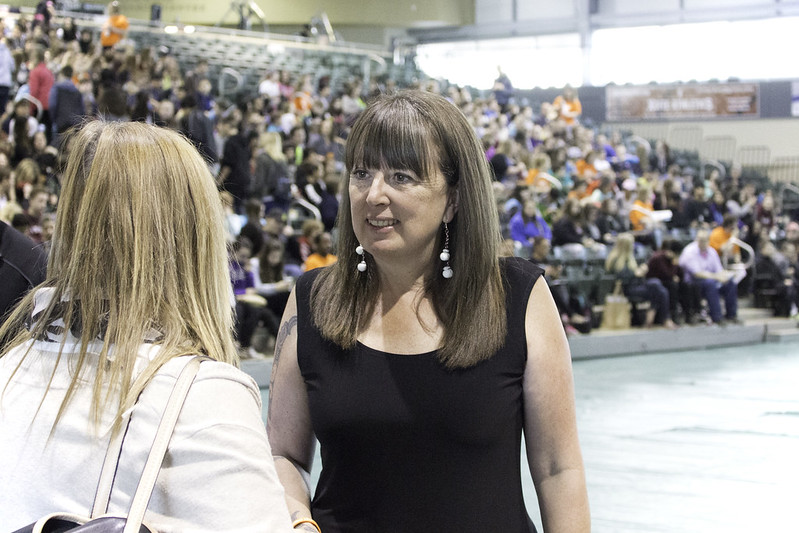
Interview with NCTR Education Lead Charlene Bearhead
Charlene Bearhead, Education Lead with the National Centre for Truth and Reconciliation (NCTR), worked closely with the Faculty of Education in every aspect of the planning and budgeting for the Day of Education. She hopes to “see a Day of Education at every Faculty of Education across the country.” The following is an interview with Charlene Bearhead.
Describe your role as Education Lead with the NCTR?
I am responsible for the engagement of Ministries of Education, School Divisions, Faculties of Education, School Board Associations, Teachers’ Organizations and all other education organizations and agencies across Canada. This includes public education and outreach towards our goal of educating every person living in Canada about the history and legacy of Indian Residential Schools and to engage Canadians in meaningful reconciliation.
How did this partnership between the U of R and NCTR come about?
I have been connected with the Faculty of Education at the University of Regina (U of R) for some time through my work as the National Coordinator of Project of Heart. The Faculty of Education at the U of R is such a natural fit for a partnership with NCTR for so many reasons not the least of which is the incredible and authentic commitment, leadership, and action on addressing the voids in education in the areas of all that is Indigenous in such a genuine and respectful manner.
How many Days of Education has NCTR jointly hosted?
The Truth and Reconciliation Commission hosted six Education Days within its National Events and NCTR hosted one in Winnipeg for the official opening of the Centre on November 4, 2015.
What was unique about the “Walking Together: A Day of Education for Truth and Reconciliation at the U of R?
It was the first one ever to be hosted by a University. The overwhelming success of the U of R day has inspired the University of Manitoba (U of M) Faculty of Education and the Faculty of Education at University of Prince Edward Island (UPEI) to host their own events this fall.
Why are Days of Education for Reconciliation important?
These days of education give the unique opportunity for students and teachers to come together to experience learning with one another, to engage in authentic learning experiences that might not be otherwise available in their own schools and communities, and to understand that they are a part of something much bigger than an individual school or community. It gives students and teachers the opportunity to garner ideas and experience learning that they can then take back and share in their home schools to promote the seeking of truth and reconciliation in their families and communities.
You’ve been known to use the word “ReconciliACTION.” What is the passion behind this word for you?
The term “ReconciliACTION” was coined by Stan Wesley who is an amazing and inspiring Anishnabe mentor from Ontario. I love the term because it embodies the understanding that if we don’t actually take action on our learning nothing will change. I’ve borrowed the term from Stan with his blessing as have many others across the country.
What outcomes have you seen resulting from these Days of Education? And specifically the U of R?
The positive action and energy that have resulted from these Education Days is endless. The most important outcome is that they inspire people in other parts of the country to host their own gatherings of authentic, experiential learning and ReconciliACTION. The U of R day has inspired the U of M and UPEI among others.
There will be many more truth and reconciliation days of education at Faculties of Education across the country as a result of April 14, 2016 at the U of R. In fact I have had a call from the North Dakota State University in Fargo, ND, as a direct result of the U of R education day media coverage.
What does Reconciliation Mean to You?
School Children’s Responses After a Day of Education for Truth and Reconciliation
“Reconciliation means a promise.” Ashton Boyd
“Revering a culture.” Zander
“Learning about First Nations past, and being courageous to make a difference.” Jasmine Mcrae
“Treating everyone equal.” Peter
“No one is judged by what they wear or what colour skin they have.” Abby Larsen
“Treat others the way you want to be treated.” Nhicole Padora
“Equality no matter what your culture is.” Mia Sander
“Treating other people fairly.” Alliyah Lara
“Change the world.” Lauryn Towers
“Make sure everyone fits in together.” Preslyn Wilson
“Treating everyone equal.” Breanna K.
“Stop hurting other people’s feelings.” Cole
Colours just a colour; it doesn’t define who you are.” Alyssa
“Everybody can be equal; no one should be left out.” Merissa Tomaschefski
“Everyone to have equal rights.” Sasha Romanow
“Stop racism: Where I see it, I will stand up to it.” Zia Knox
“Accept everyone has culture; they be themselves.” Himashi Gunasinghe
“Love people for who they are.” Hailey Johnson
“Change past -> better future.” Mackenzie Sheane
“Right the wrongs.” Malena Jensen
Video: Prairie South Students Presented “Voices of Youth” at the Day of Education
Tweet what your #ReconciliaCtion includes using the hashtag #myreconciliationincludes
Day of Education for Reconciliation at the University of Regina in the News
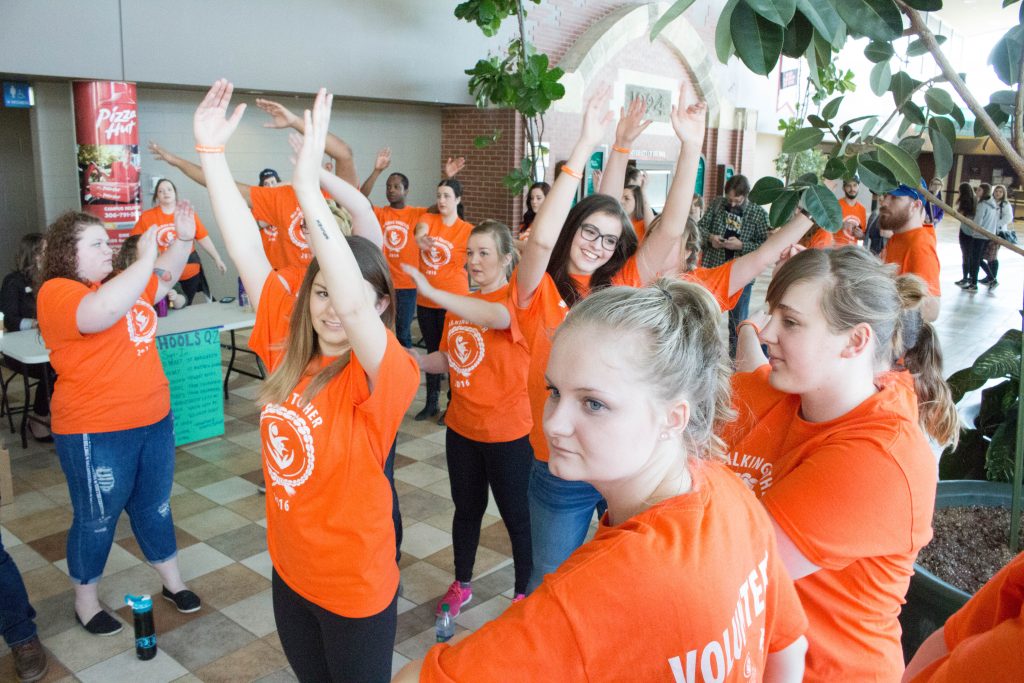 Global News coverage of Day of Education
Global News coverage of Day of Education
Truth and Reconciliation Presentation
https://www.facebook.com/GlobalReginaNews/videos/10154271729421091/
Day of Education for Reconciliation
